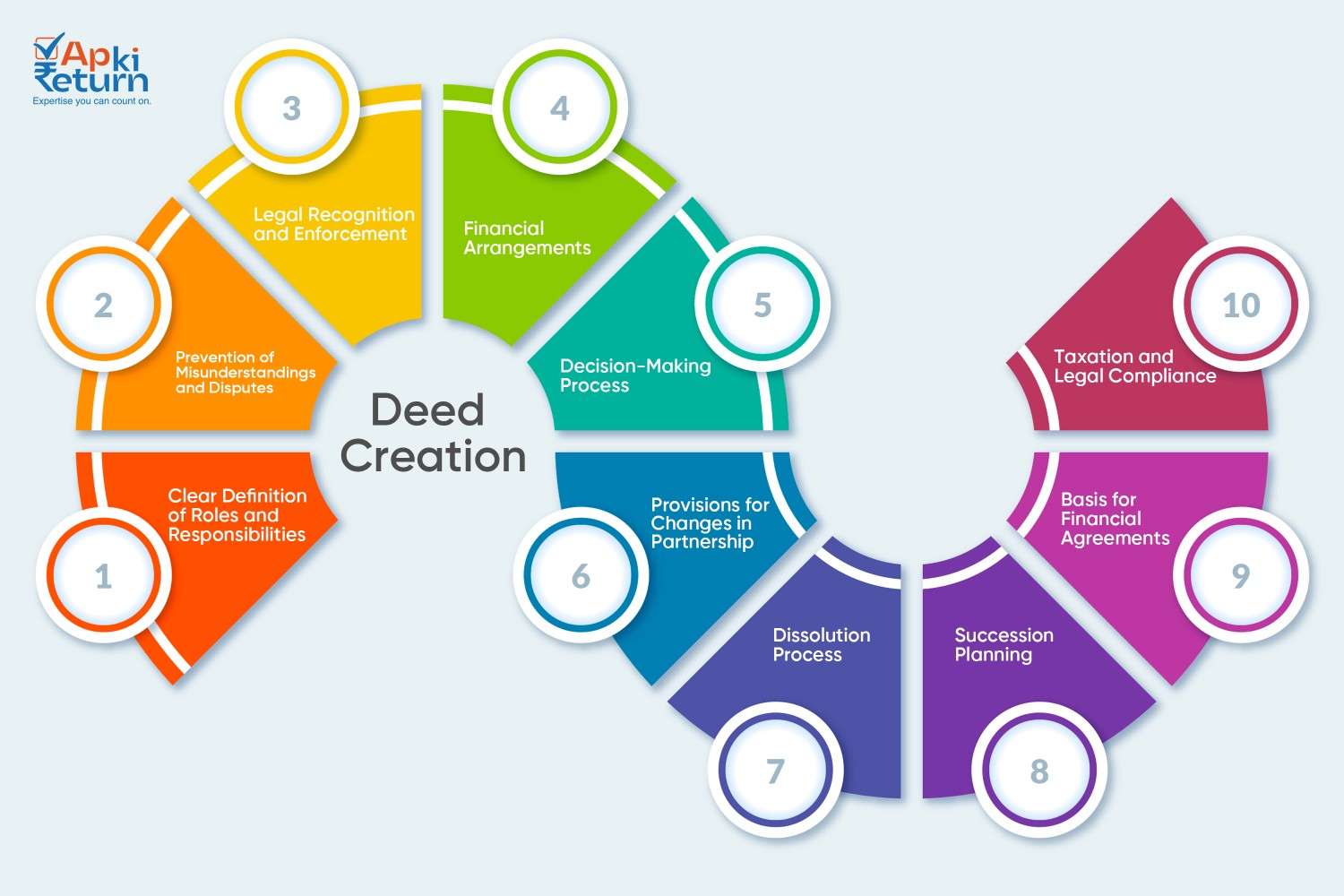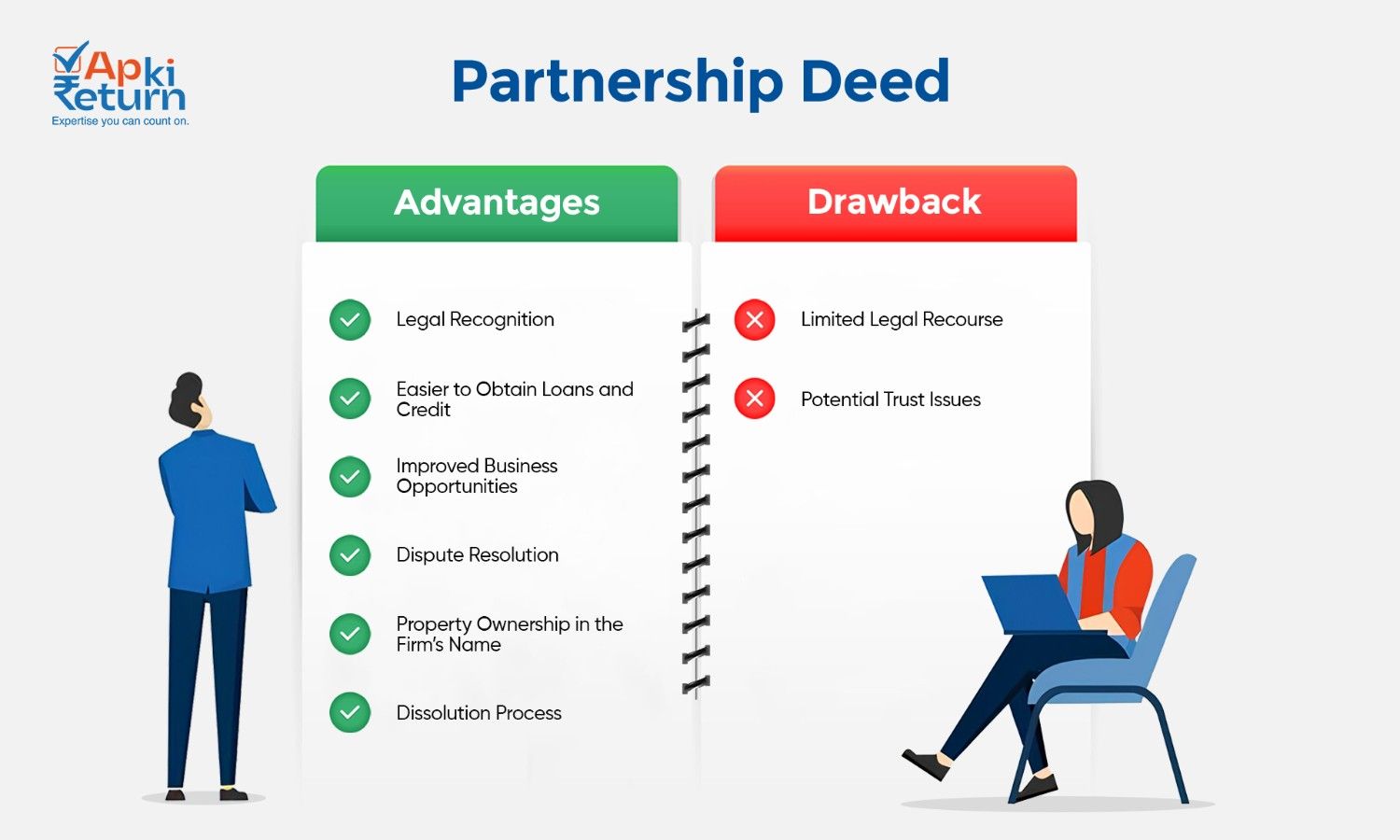Ensure your Partnership Deed is flawless and safeguarded against future tax liabilities with the expertise of the Apki Return team. We meticulously review and rectify any deficiencies to protect your partnership from potential tax challenges.
A partnership deed is a written agreement between two or more individuals who join as partners to form and run a business. The purpose of this document is to outline the rights, responsibilities, and obligations of each partner in the business. In India It’s like a rule book for the partnership, detailing everything from who’s involved, how profits are shared, to what happens if the partnership needs to end. It is crucial for avoiding misunderstandings and disputes among partners and provides a clear roadmap for the management and operation of the business.
Clearly state the name under which the partnership will operate and the nature or type of business activities it will undertake.
Specify whether the partnership is for a limited period, a specific project or is to continue indefinitely.
Detail the amount of capital each partner is contributing to the partnership, whether in cash, property or services.
Describe how profits and losses will be shared among partners. This is usually in proportion to their capital contributions, but the deed should specify the exact terms.
Define the roles and responsibilities of each partner, especially who will manage the day-to-day operations. Also, outline how decisions will be made, whether by majority vote, consensus or through a designated managing partner.
State if any partner will receive a salary for their role in the partnership and the terms for partners drawing money from the business.
Provide guidelines for adding new partners or the exit of existing partners, including how their capital account will be settled.
Include procedures for resolving disputes among partners, which could range from mediation to arbitration.
Outline the conditions under which the partnership may be dissolved and the process for winding up the business, including distribution of assets.
Specify how the partnership deed can be amended, ensuring flexibility for future changes in the partnership.
Detail the banking arrangements, including who can sign checks and access the partnership’s accounts.
State how the business’s financial records will be kept and the frequency of audits.
Provide a plan for what happens if a partner dies or becomes incapacitated, including the impact on partnership shares and operations.

A partnership deed clearly outlines the roles, responsibilities, and duties of each partner. This clarity helps in efficient management and smooth running of the business.
By detailing the terms of the partnership agreement, a deed helps prevent misunderstandings and disputes between partners. It serves as a reference point for resolving conflicts.
A written and properly executed partnership deed is legally binding. This means it can be enforced in a court of law, providing legal protection to the partners in case of disagreements or breaches of the agreement.
The deed specifies the financial contributions of each partner, profit-sharing ratios, and other financial arrangements. This transparency helps in maintaining trust among partners and ensures fair financial practices.
By outlining the decision-making process, the deed ensures that business decisions are made efficiently and democratically, respecting the views of all partners.
The deed can include provisions for admitting new partners, handling the departure of existing partners, and other changes in the partnership structure. This flexibility is essential for the evolving nature of business.
In case the partnership needs to be dissolved, the deed outlines the process for dissolution, ensuring a systematic winding up of business affairs
The deed can include terms for handling the event of a partner’s death or incapacity, providing clarity and continuity for the remaining partners.
Banks and financial institutions often require a partnership deed to understand the business’s structure before extending credit or loans.
A partnership deed helps in maintaining clear records for taxation and legal compliance, as it details the financial and operational aspects of the business.
Whether partnership deed is required to get registered and its benefits:
Under the Indian Partnership Act, 1932, registration of a partnership firm is optional. Partners may choose to register their deed with the Registrar of Firms.

A registered partnership is legally recognized. This can be advantageous in legal matters, such as litigation, where a registered firm has a standing to file suits against third parties or partners.
Financial institutions often prefer dealing with registered entities. Registration can enhance credibility, making it easier to secure business loans and lines of credit.
Many corporations and government agencies prefer to transact with registered entities. Registration can open up more business opportunities.
Registered partnerships have a clearer legal standing in disputes among partners or with external parties. The terms of the partnership deed become more enforceable.
A registered partnership can hold property in the firm’s name. This is not possible in an unregistered partnership, where property must be held in the name of the individual partners.
The process of dissolving a registered partnership is more straightforward, with clear legal guidelines to follow.
An unregistered partnership firm cannot bring legal action in a court against any partner or third party for enforcing rights arising from a contract.
Unregistered firms might face trust issues from stakeholders due to the lack of formal recognition.
This Deed of Partnership is made on this [Day] day of [Month], [Year] by and between:
[Include additional partners as necessary]
Collectively referred to as the “Partners.”
WHEREAS the parties hereto have decided to form a partnership firm under the name and style of [Firm Name] at [Firm Address], and
WHEREAS the parties are desirous of recording the terms and conditions of their partnership.
NOW THEREFORE THIS DEED WITNESSES AS UNDER:
IN WITNESS WHEREOF, the parties hereto have set their hands on this Deed on the day and year first above written.
[Signatures of All Partners]
Witnessed by:
Yes, a partnership agreement can be oral. However, a written deed is preferable for clarity and as evidence in case of disputes.
The process varies by jurisdiction. Generally, it involves submitting the deed to the relevant authority (like the Registrar of Firms in India) along with required forms and fees.
Without a deed, the partnership is governed by the default rules of the relevant Partnership Act of the country, which may not align with the partners’ intentions.
Yes, the terms can be changed with the consent of all partners. The changes should be documented in a written amendment to the original deed.
Yes, all partners must agree on the terms and conditions of the deed and usually must sign it.
While not always mandatory, a registered partnership deed can enhance credibility and trustworthiness, making it easier to obtain financing.
A partnership deed itself does not directly affect tax liabilities, but it documents the profit-sharing ratio, which is crucial for tax purposes.
This should be addressed in the deed. Common provisions include continuation of the partnership with the remaining partners or dissolution and settlement.
Yes, new partners can be added, but this requires drafting an amendment to the original deed or creating a new deed.

We proudly announce our new website packed with updated data, resources, and valuable information